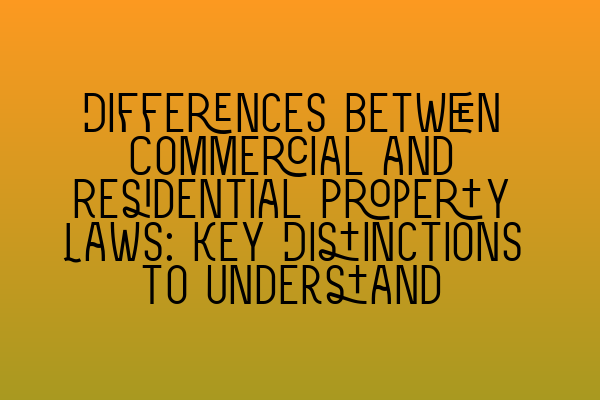Differences between Commercial and Residential Property Laws: Key Distinctions to Understand
When it comes to property law, there are important distinctions to be made between commercial and residential properties. Both types of properties have their own set of rules, regulations, and considerations. Whether you are a solicitor, a property owner, or someone looking to invest in real estate, it is crucial to understand these differences to navigate the legal landscape effectively. In this article, we will explore the key distinctions between commercial and residential property laws in the UK.
Overview of Commercial Property Laws
Commercial properties refer to buildings or land that are used for business purposes, such as offices, retail stores, warehouses, or industrial units. The laws surrounding commercial properties are more complex compared to residential properties due to the commercial nature of the transactions involved. Here are some key distinctions to keep in mind:
- Lease terms: Commercial leases are typically longer and more complex compared to residential leases. They often involve detailed provisions regarding rent reviews, break clauses, repair obligations, and rights to assign or sublet.
- Landlord and tenant relationships: Commercial tenancies are considered contractual relationships and are subject to negotiation between the landlords and tenants. The principles of freedom of contract generally apply, allowing greater flexibility in establishing the terms of the lease.
- Business considerations: Commercial property laws take into account business considerations such as zoning restrictions, planning permissions, licensing requirements, and compliance with health and safety regulations. These considerations are not as prominent in residential property transactions.
- Dispute resolution: Disputes in commercial property matters are often resolved through alternative dispute resolution methods such as arbitration or mediation. Court litigation is generally considered a last resort due to the desire for swift and cost-effective resolutions.
Overview of Residential Property Laws
Residential properties refer to buildings or land used primarily for housing individuals and families. The laws governing residential properties are designed to protect the rights of tenants and provide a framework for property ownership. Here are some key distinctions to be aware of:
- Tenancy types: Residential tenancies are typically governed by specific types of tenancy agreements, such as assured shorthold tenancies or regulated tenancies. These agreements offer varying levels of tenant protection and dictate the rights and responsibilities of both landlords and tenants.
- Deposit protection: In residential tenancies, landlords are required to protect their tenants’ deposits in a government-approved tenancy deposit scheme. This ensures that tenants can recover their deposit at the end of the tenancy or dispute any deductions made.
- Eviction processes: The eviction of residential tenants is subject to strict legal procedures. Landlords must follow specific notice periods and obtain a court order to legally evict a tenant. Unlawful eviction can lead to severe penalties.
- Consumer protection: Residential property transactions are subject to consumer protection laws, ensuring that buyers are provided with clear information about the property’s condition, any known defects, and potential hazards.
Conclusion
Understanding the distinctions between commercial and residential property laws is essential for anyone involved in the property industry. Whether you are a solicitor, a landlord, a tenant, or an investor, being knowledgeable about the specific legal requirements and considerations for each type of property will help you navigate the complexities of property transactions effectively.
If you would like to learn more about property law, legal challenges in property transactions, or lease laws in the UK, check out our related articles:
- Updates in UK Property Laws: Key Changes and Implications
- Legal challenges in property transactions: A comprehensive guide
- Navigating Lease Laws in the UK: Essential Guidelines for Tenants and Landlords
- Dominate Property Law Questions: Avoiding Common Pitfalls
- Land Law Revision Tips: Ace Your Exam Preparation
